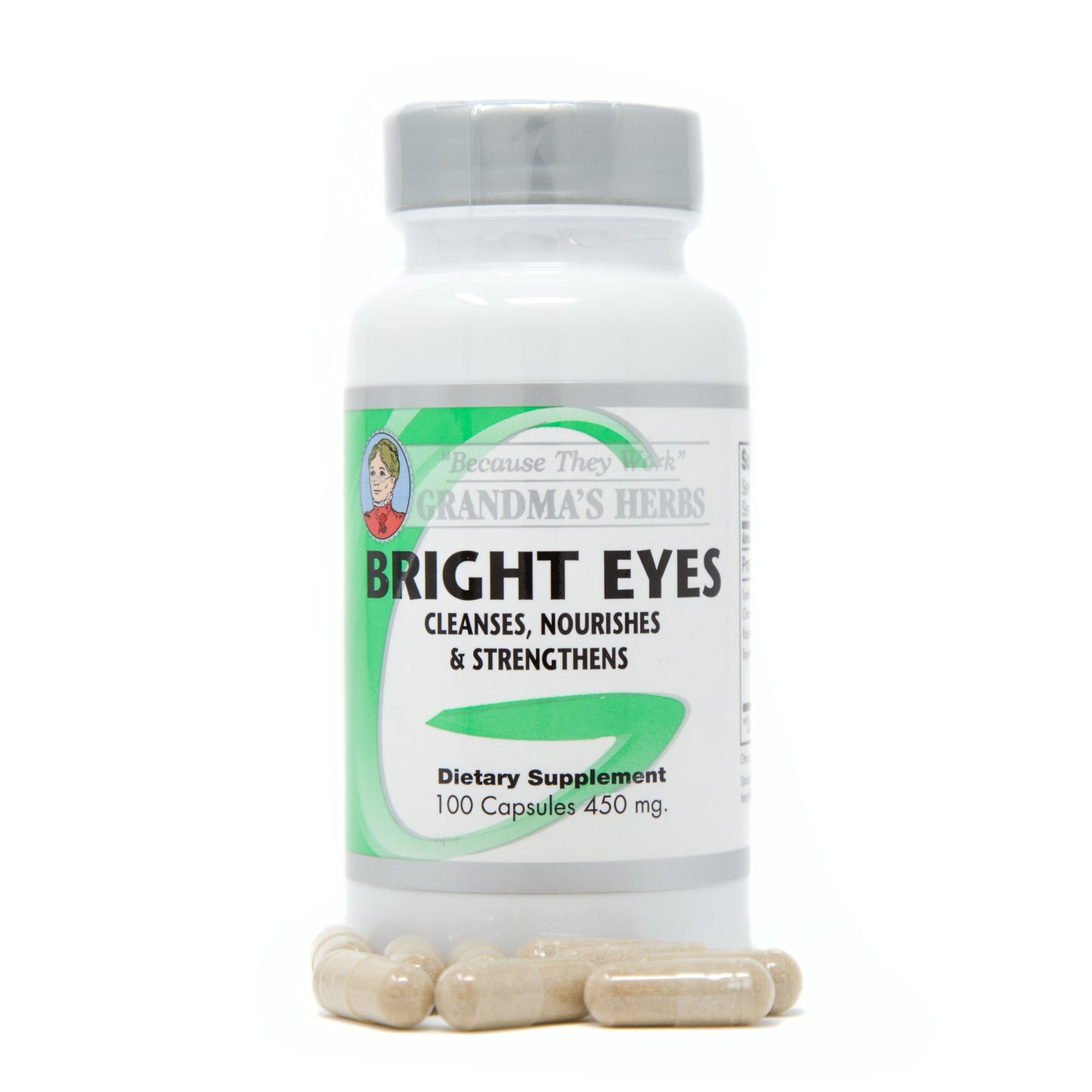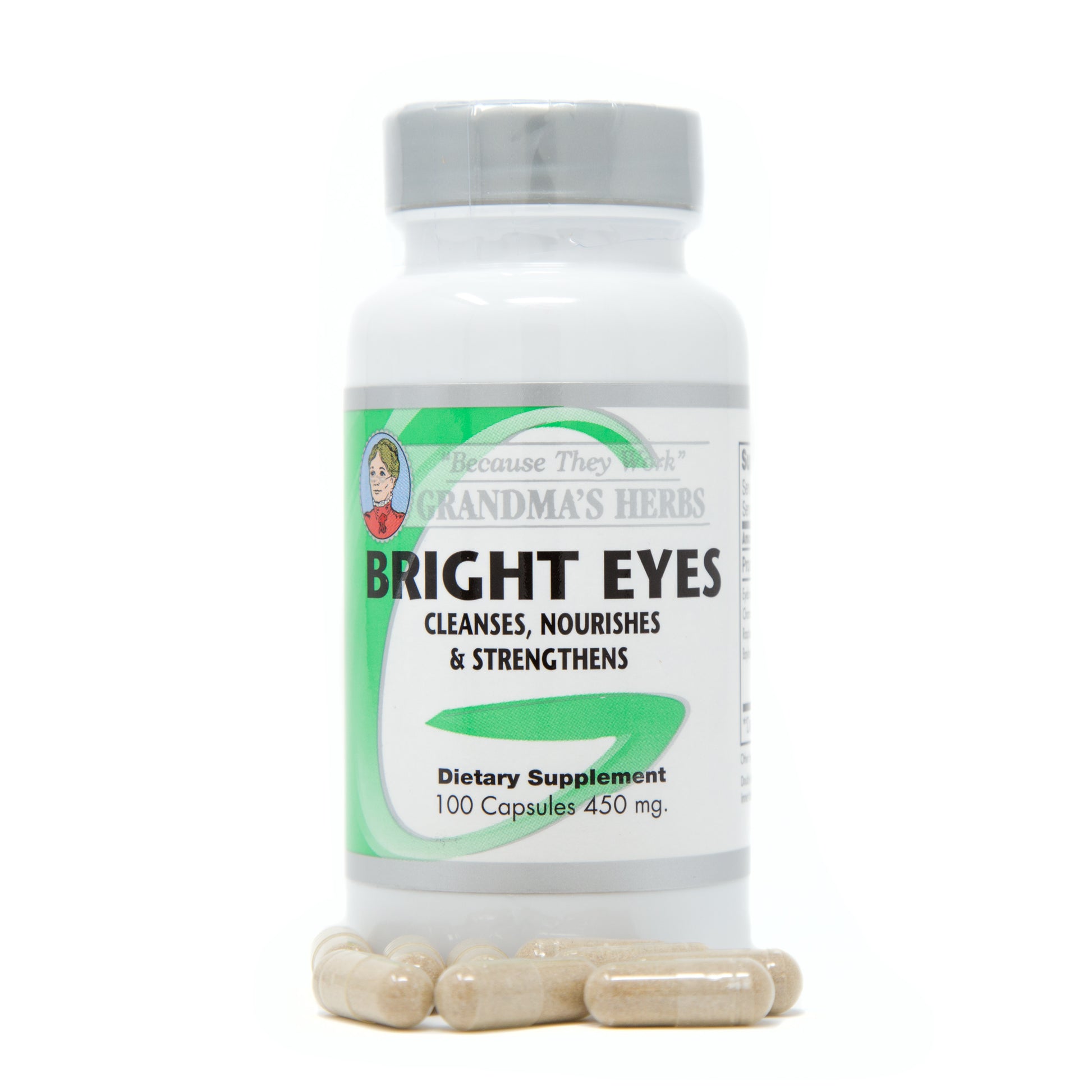Grandma's Herbs
Bright Eyes
Bright Eyes
Couldn't load pickup availability
Research:
Eyebright
Eyebright (Euphrasia officinalis L.) is a flowering plant that has been traditionally associated with eye-related wellness practices for centuries. Native to Europe, eyebright derives its name from its historical use in traditional herbal applications. The plant is known for its delicate, daisy-like flowers and is often included in herbal formulations focused on promoting general wellness.*
Eyebright contains a variety of naturally occurring compounds, including flavonoids, tannins, and aucubin. Flavonoids are well-known for their antioxidant properties, which may help neutralize free radicals and support overall cellular health. Tannins are astringent compounds that, in traditional herbal practices, have been used to support the health of tissues. Aucubin, another active component, is often studied for its potential role in supporting the body’s natural processes.*
Bayberry: A Traditional Herb with Antioxidant Support
Bayberry (Myrica rubrae) has been traditionally recognized in herbal practices for its astringent properties. The plant contains myricetin, a naturally occurring flavonoid found in its bark, leaves, and roots, which is known for its antioxidant properties.*
Antioxidants, such as myricetin, play a role in helping the body neutralize free radicals. Supporting the body’s natural defense mechanisms against oxidative stress is an important aspect of overall well-being.*
Emerging research highlights the potential benefits of myricetin and other antioxidants in promoting general health. While ongoing studies explore its potential roles, antioxidants are broadly valued for their contribution to maintaining long-term health, including supporting cellular health and balance in the body.*
Fennel Seeds
Fennel seeds are traditionally recognized for their naturally occurring compounds, including flavonoid antioxidants, which are valued for their role in supporting overall wellness. Fennel is known for its phenolic compounds, including bioflavonoids, phenolic acids, tannins, coumarins, and hydroxycinnamic acids. These compounds contribute to fennel's antioxidant properties, which may support the body in neutralizing free radicals and maintaining cellular health.*
Fennel contains nutrients, such as choline, and natural antioxidants that are associated with supporting cellular health. These nutrients play a role in maintaining cellular membranes and supporting nerve impulses, which are essential for overall bodily function. Fennel's composition makes it a subject of interest for its potential contributions to wellness, including eye health.*
While fennel has a history of traditional use, further research is needed to explore its full potential in promoting ocular health and function. Incorporating fennel as part of a balanced diet may complement a lifestyle focused on maintaining overall well-being.*
Red Raspberry
Red raspberry is a plant known for producing the popular and flavorful berry, widely consumed for its taste. Beyond its culinary uses, both the fruit and leaves of the red raspberry have been traditionally utilized for supporting overall health. Historical references to the use of red raspberry outside of food date back to 1957 in “The Herbal,” a book that documented its broader applications. Red raspberry has been studied for its potential health benefits, including its antioxidant properties and possible effects on circulatory function.*
Research indicates that red raspberry fruit contains antioxidants, which may help protect cells from oxidative stress. Additionally, some studies suggest that compounds in red raspberry, such as its ketone component, may share structural similarities with capsaicin (found in cayenne pepper), a compound traditionally associated with vascular health.*
Goldenseal Root
Goldenseal, a plant native to North America, has a long-standing history of traditional use in promoting general wellness. Initially utilized by Native American communities and later adopted by European settlers, it is now a popular choice in herbal practices. The roots of goldenseal are often processed into teas, extracts, capsules, or tablets, and it is commonly paired with echinacea in herbal formulations.*
Goldenseal contains active alkaloids such as hydrastine, palmatine, canadine, and berberine. Among these, berberine has been studied for its antioxidant properties, which are recognized for their role in supporting cellular health. Antioxidants are thought to help neutralize free radicals, contributing to the maintenance of healthy tissues and systems.*
Goldenseal has a rich history of use in traditional practices, where its antioxidant properties have been appreciated for supporting overall health and well-being.*
While research continues to explore goldenseal’s potential role in protecting against oxidative stress and promoting general wellness, it remains a valued herb in the context of balanced herbal support.*
The information provided above is for educational purposes only and does not pertain to the performance or intended use of any specific products featured on this website.
*These statements have not been evaluated by the Food and Drug Administration. This product is not intended to diagnose, treat, cure, or prevent any disease.
Help Me Choose:
Eye health can be affected by multiple factors, such as genetics and the natural aging process. Supporting eye health through a balanced diet rich in antioxidants, vitamins, and essential nutrients is one way to promote overall visual wellness. Foods high in antioxidants, such as leafy greens, berries, and colorful fruits and vegetables, provide nutrients that may help protect eye cells from oxidative stress.*
In addition to a nutrient-dense diet, maintaining a healthy lifestyle that includes regular physical activity, and proper hydration can further contribute to long-term eye health. Protecting the eyes from excessive sunlight exposure and getting regular eye check-ups are also key practices in supporting vision over time.*
The information provided above is for educational purposes only and does not pertain to the performance or intended use of any specific products featured on this website.
*These statements have not been evaluated by the Food and Drug Administration. This product is not intended to diagnose, treat, cure, or prevent any disease.
Health Information:
For the Health of Your Eyes!
Eat Right for Your Eyesight
Supporting eye health through nutrition is essential. A diet rich in fruits and vegetables, particularly dark leafy greens like spinach, kale, and collard greens, can provide important nutrients for maintaining eye health. Research also suggests that fish high in omega-3 fatty acids, such as salmon, tuna, and halibut, may offer additional eye health benefits.*
Maintain a Healthy Weight
Keeping a healthy weight can contribute to overall wellness, including eye health. Being overweight or obese can increase the risk of developing systemic conditions, which may affect vision over time. For support with weight management, consider consulting a healthcare provider.*
Use Protective Eyewear
Wearing protective eyewear during sports or home activities is essential for eye safety. Options include safety glasses, goggles, shields, and eye guards designed for specific tasks. Many of these lenses are made of polycarbonate, a material much stronger than regular plastics. Protective eyewear is available through many eye care providers and sporting goods stores.*
Wear Sunglasses for UV Protection
Sunglasses are more than a fashion accessory; they protect your eyes from harmful UV rays. When choosing sunglasses, look for lenses that block 99 to 100 percent of both UV-A and UV-B radiation to help support long-term eye health.*
Follow the 20-20-20 Rule for Eye Rest
If you spend extended periods at a computer or focusing on one activity, your eyes may become fatigued. The 20-20-20 rule can help alleviate this: every 20 minutes, look 20 feet away for 20 seconds. This practice may reduce eyestrain and support comfort during prolonged tasks.*
Practice Good Contact Lens Hygiene
Proper hygiene is crucial for contact lens wearers. Always wash your hands thoroughly before handling lenses, follow disinfection instructions, and replace lenses as recommended.*
Practice Eye Safety in the Workplace
In workplaces where protective eyewear is required, wearing the appropriate gear consistently can help prevent injury. Employers are responsible for providing a safe environment, so make sure to follow safety guidelines and encourage colleagues to do the same.*
The information provided above is for educational purposes only and does not pertain to the performance or intended use of any specific products featured on this website.
*These statements have not been evaluated by the Food and Drug Administration. This product is not intended to diagnose, treat, cure, or prevent any disease.
Ingredients:
Eyebright (herb), Fennel (seed), Rue (herb), Chamomile (flower), Goldenseal (root), Red Raspberry (leaves & pulp), Blue Vervain (herb), Bayberry (bark), Cayenne Pepper (40,000 HU)
Instructions:
Take 2 capsules morning and evening as needed.*
*These statements have not been evaluated by the Food and Drug Administration. This product is not intended to diagnose, treat, cure, or prevent any disease.
What’s Included:
1 bottle of Grandma's Herbs BRIGHT EYES* - 100 Capsules
Features:
BRIGHT EYES contains the herbs Eye Bright. Traditionally the herb Eyebright is known as an astringent. Eyebright (the herb) has naturally occurring vitamins A, B, C, D & E, along with iron silicon, copper and zinc as micro-nutrients.*
The information provided above is for educational purposes only and does not pertain to the performance or intended use of any specific products featured on this website.
*These statements have not been evaluated by the Food and Drug Administration. This product is not intended to diagnose, treat, cure, or prevent any disease.
Share




